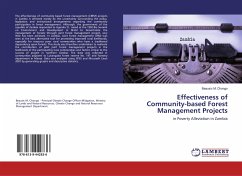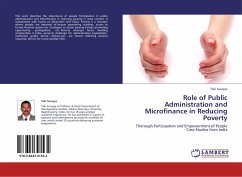
Evaluating the Effectiveness of Out-grower Projects in Reducing Poverty in Rural Zambia. A Case of the Eastern Province

PAYBACK Punkte
0 °P sammeln!
Doctoral Thesis / Dissertation from the year 2020 in the subject Business economics - Business Management, Corporate Governance, University of Lusaka, language: English, abstract: The Living Conditions Monitoring Survey (LCMS) conducted in 2015 revealed that rural poverty stood at 76.6 percent and 23.4 percent for urban poverty respectively. To this effect, rural poverty still remains high and predominantly a rural phenomenon. This study sought to evaluate the effectiveness of the out-grower schemes on reducing poverty and answer the general research question on how effective were the out-grow...
Doctoral Thesis / Dissertation from the year 2020 in the subject Business economics - Business Management, Corporate Governance, University of Lusaka, language: English, abstract: The Living Conditions Monitoring Survey (LCMS) conducted in 2015 revealed that rural poverty stood at 76.6 percent and 23.4 percent for urban poverty respectively. To this effect, rural poverty still remains high and predominantly a rural phenomenon. This study sought to evaluate the effectiveness of the out-grower schemes on reducing poverty and answer the general research question on how effective were the out-grower schemes in reducing poverty in rural Zambia.Pragmatism was the philosophical view that underpinned the study and it applied to the mixed research method approach for this study. The convergent parallel strategy of the mixed research method approach was used. The target population was 50,000 smallholder farmers and a questionnaire with open ended questions (qualitative) and closed questions (quantitative) was administered to a sample size of 396 smallholders farmers. Simple random sampling was used to select smallholder farmers.Qualitative data was analyzed by using the inductive process of building from the data to broad themes and then to interpretation. Quantitative data was analysed by using the Chi-square tests to ascertain association between critical variables measured by categories of out-grower farmers and independent farmers. The T-tests compared the treatment and control groups on variables of interest. The coefficient of variation (CV) was used to gauge the level of respondents' disagreement (dissention) in responses while coefficient of consensus (CC) was used to gauge the level of respondents' agreement (consensus) in responses, applied to the Likert scale and any other ordinal responses.The findings from the study revealed that the out-grower schemes implementation has contributed to a positive change in poverty reduction to smallholder farmers participating in the out-grower scheme. Further, out-grower farmers have improved their knowledge in understanding the operation of the out-grower scheme. Subsequently, the out-grower schemes have benefited the communities. In this regard, the study concluded that the out-grower schemes have been effective in reducing poverty in the rural areas of Zambia. The study recommended that there was need to address the issue of power imbalance between the out-grower farmers and the out-grower firms.













